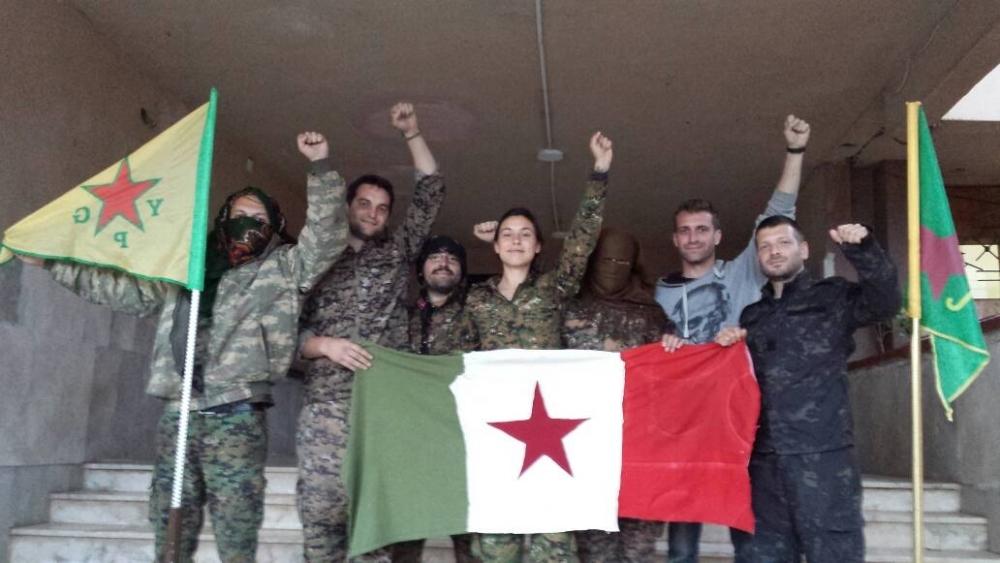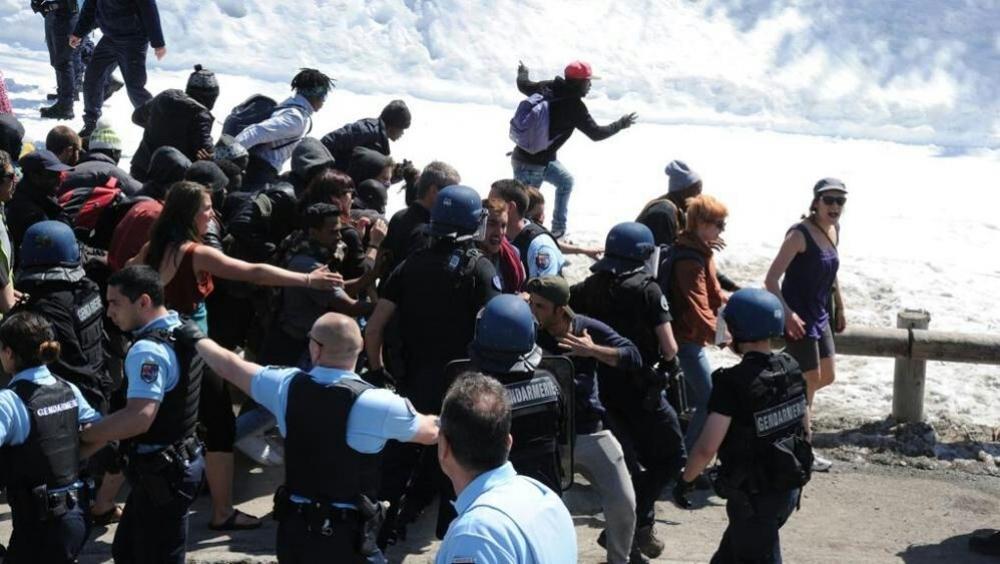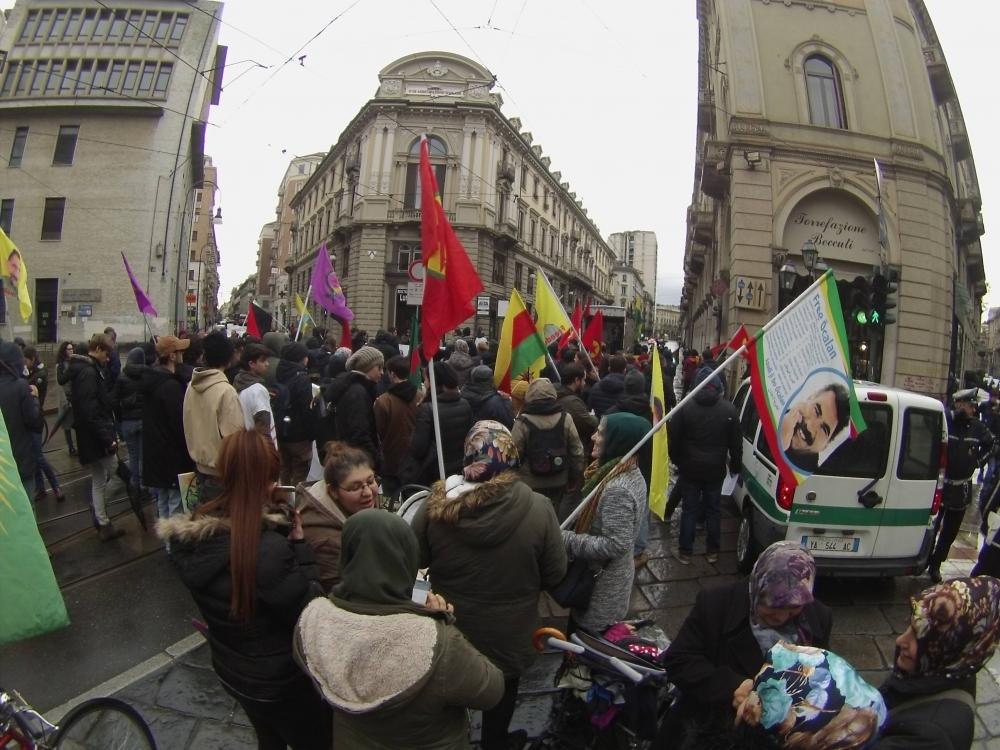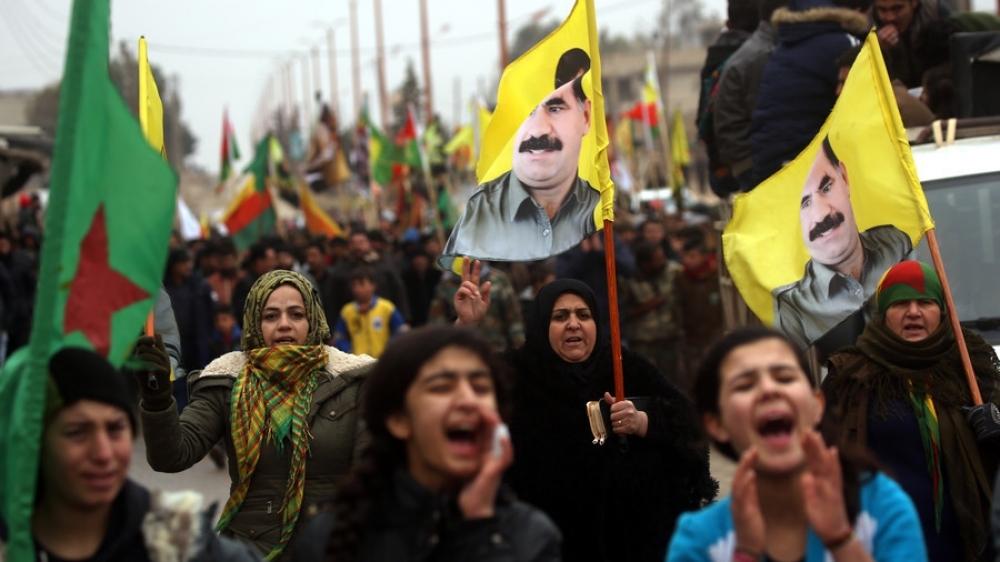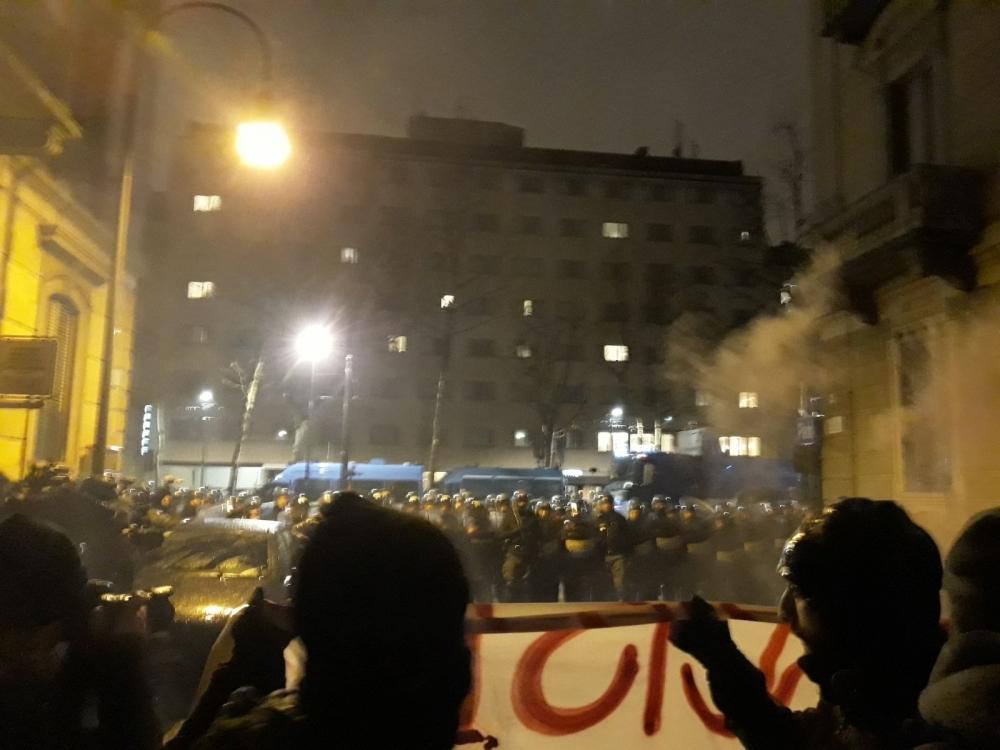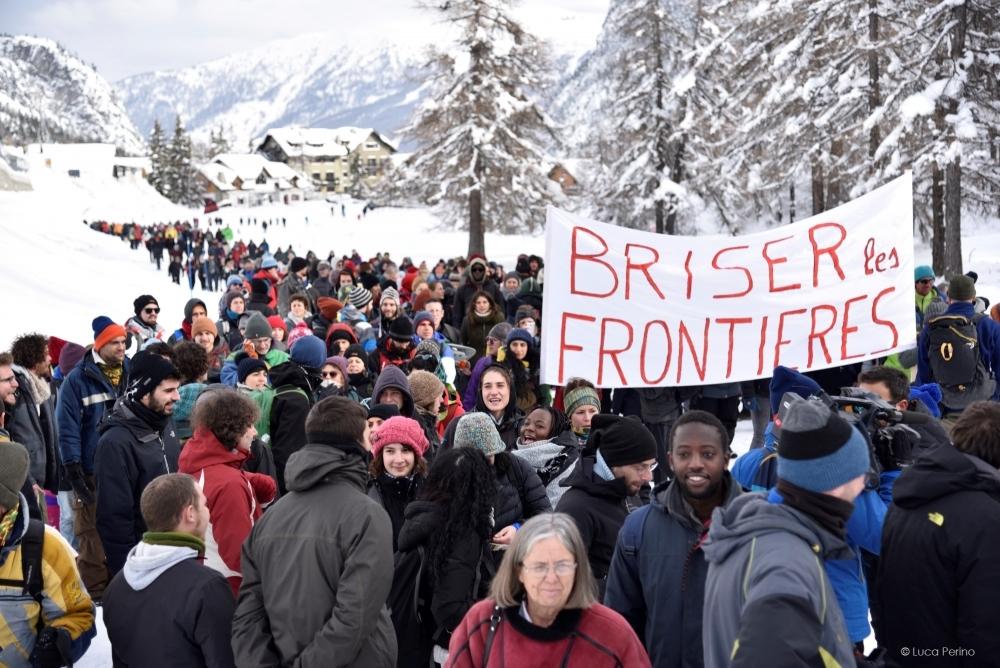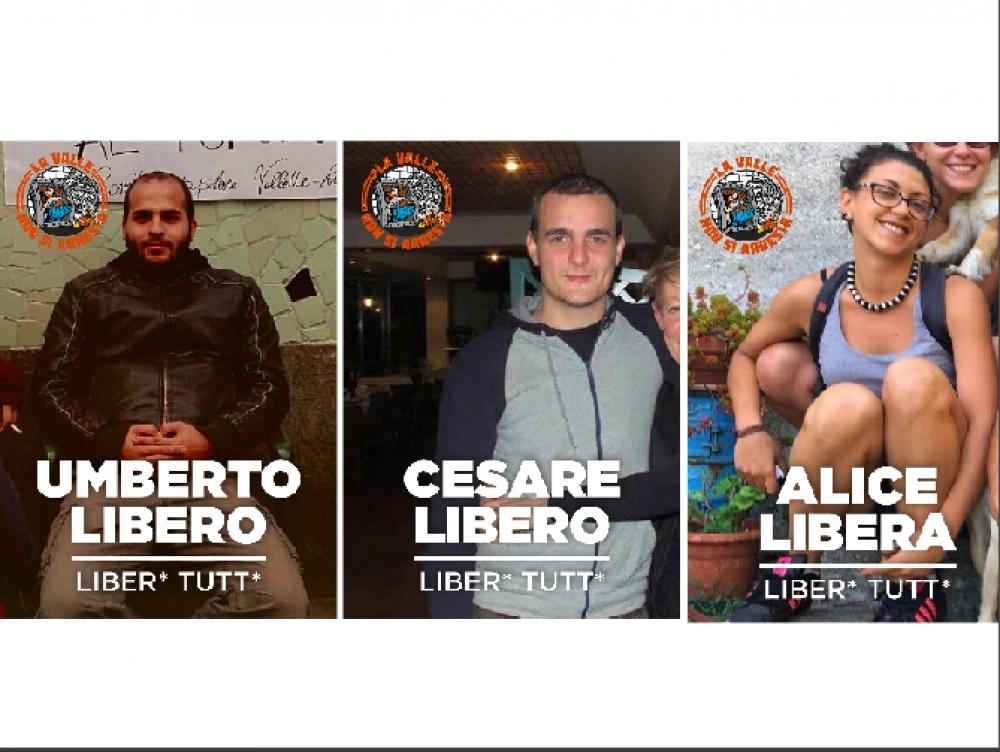Democratic transitions: between drums of war and barricades for peace
by Fulvio Massarelli
Original article in Italian here
As two US warships are heading to Libyan coast, the western strategy of democratic transitions takes yet another hard blow. With the assault on the US embassy in Libya, the crisis deepens – as the western powers attempt to lead the revolutionary processes around the Mediterranean Sea, to normalize them. Being it the pact with liberal islamism or the political and military pressure to turn the revolutionary processes into civil wars, the financial, medial, moral and political apparatus of capture of the “regime change” cannot consolidate itself. On one side, it finds an extraordinary resistance in the present magnitude of the revolutionary processes, and clashes with it; and, on the other side, it deals with a revival of the clash of civilizations that, still today, mobilizes in the squares of the Arab capitals some thousand radical islamists (yet not for this less fierce and politically influent – and that in the next days may increase). It is a political and cultural presence that, in the past year, either stood looking from a distance the revolutionary battleground – along with the moderate factions, waiting for the democratic transition to open up for them the ballot boxes (as in Tunisia and Egypt) – or worked as a corrupting agent on the “fringes” of the movements against the regimes (in Libya as in Syria, for example). Two options for a government of crisis in the Mediterranean Sea urged by the United States, the EU and the Gulf monarchies – to beat the revolutionary movements in their course of liberation from poverty conditions and confuse them. The Islamist Thermidor – with its obsession for the bodies and the urge of reactivating a dispositive of fear against the governed – and the provocations and corruption, on the fringes and inside the movements, of small but well-equipped islamist radical factions try to play the war drums against movements. Besides, beyond the rhetoric of Obama in its Cairo University speech, it is clear for the elites that war has to be made working, to react to the proletarian insurgency against crisis that ranges from the Atlantic coast as far as Bahrain, and beyond. There is no New Deal and they don’t want one… quite the opposite!
As we were watching in horror the bombings on Libya, we questioned ourselves about why there was no movement against the war. According to me no satisfactory answer was found, because we did not reverse the question: “how are workers and young proletarians struggling for peace right now?”. Perhaps, still too bounded to the culture of the peace movement against Bush’s endless war, we imagined that the pacifist demand would only show up as a massive public opinion movement: that in its ethical refuse, just and uncompromising, of the massacre against Iraqi and Afghan population carried out by the White House and its associates, tried to sabotage the war – also mobilizing millions of people all over the world. Perhaps, it was also for this reason that we didn’t pick up the need and desire for peace coming among the barricades around Tahrir square, in the casbah of Tunis, in Syntagma square, in Plaza del Sol, in the vicinities of Zuccotti Park. A demand of peace not carved out anymore from the social processes and kept up above into an ideal sphere, but well linked in the struggle against misery and poverty. Missing and lacking a New Deal the radically warring character of the crisis, actually complying with the capitalist interest of demolishing what remains of the welfare, is in that destructive violence, ready to dispossess every form of life. And that is why the movements in the insurgent cities of the Mediterranean, starting from this point of view, affirmed the urgency of peace in terms of reappropriation of a life-long stolen wealth. In the struggle for dignity and social justice, in Tunisia as in Greece, the “Dégage!” call resounds against the regimes of war. This exceptional effort of the movements in Northern Africa has also been characterized by the breakdown of the order of the endless war, of crusades and jihads, brought about by a young proletariat that immediately associated itself with the faces of the students that assaulted Tower Hill in London, or stormed Rome on 14 December 2010. And how were the elites in terror, when they found out that those men and women did not turn anymore to political islam, to sort out the problems of their everyday life of misery! How were they in terror, listening to hundred of thousands of people shouting “we are not afraid anymore” in front of Ben Ali and Mubarak’s police! Against this exceptional effort, they couldn’t but try to reactivate the dispositive of fear against the governed, either through the use of liberal islamism or through the construction of social and political conditions legitimizing the bombings of the “willing” – in which the “corrupting agency” of the most radical islamism is playing a decisive role. Still, this strategy of reaction and normalization that characterize democratic transitions – on which the White House and some European countries invested above all – falters and it is in crisis since its very beginning, pursued by the movements and/or shaken by its own constituent internal contradictions.
In regard to this weakness, the debate in the movement has to be open and exhaustive, starting from the issues of peace and how to build it; that now, more than ever, are linked to the first and important hints of alternatives to the capitalist crisis. And I don’t refer to frontist hypotheses whose best option may be an “everyone for himself!” call in some electoral campaign; but I’m talking about the organizational processes of struggles and the political autonomy of the movements able to give themselves their own destituent and constituent time and space. It is important to continue becoming “hub” on either Mediterranean coast, and increasing the forms of reciprocity of the struggles against precarity, poverty and misery. If we don’t add the word “peace”, to the koinè dialektos, the insurgent dialect of the movements, we risk to let ourselves lapse into catastrophic and powerless imagination. If we don’t recognize the antagonist hypothesis of peace among the Syntagma Square barricades, in the forms of social mutualism in Spain, in the struggles and revolts through Tunisia, Egypt, Bahrain, in the first occupations and self-management of factories and services, there is a risk of projecting ourselves into a “pacific war” where the players are always the same, as the victims are – now chained among jihads and crusades, and then locked in neoliberal individualism loneliness, where a “no” to war resounds in an ideal refusal up above. On the contrary, now more than ever, the struggles seem to point to a very concrete chance of peace… after all it is months since, among barricades on fire or beneath the seats of power, a “dégage” is shouted against the regimes of crisis and austerity, the regimes of war.
(13 September 2012)
Ti è piaciuto questo articolo? Infoaut è un network indipendente che si basa sul lavoro volontario e militante di molte persone. Puoi darci una mano diffondendo i nostri articoli, approfondimenti e reportage ad un pubblico il più vasto possibile e supportarci iscrivendoti al nostro canale telegram, o seguendo le nostre pagine social di facebook, instagram e youtube.











